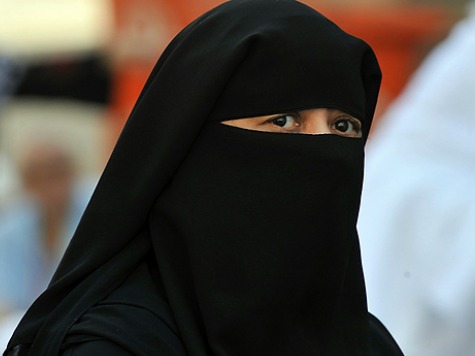
Saudi Arabia has developed an international reputation for regularly violating women’s rights, one the nation continues to feed with a new law issued by the country’s religious police, the Committee for the Promotion of Virtue and the Prevention of Vice, outlawing “tempting eyes.”
What are “tempting” eyes? One Saudi journalist mused on condition of anonymity that they are “uncovered eyes with a nice shape and makeup. Or even without makeup, if they are beautiful, the woman will be in trouble.” The Orwellian-named committee did not provide a definition of tempting, but if they happen to rely on Merriam-Webster, then it means “having an appeal.” What is an appeal? According to the dictionary, it is “arousing a sympathetic response.” And what is sympathetic? “Showing empathy,” according to Merriam-Webster.
An unnamed journalist told AINA the law is “so stupid” and “people will oppose” the new law. But the religious police are very powerful in Saudi Arabia. King Abdullah provided the organization $53 million in March. Prince Neif, heir to the throne, supports the police.
“The committee is supported by all sides,” he said. “It should be supported because it is a pillar from Islam. If you are a Muslim, you should support the committee.”
The police monitor public behavior according to the Wahhabi School of Sunni Islam. A few “crimes” include homosexuality, fornication, attempts to convert anyone away from Islam, and socializing with unrelated males and females. The police make sure stores abide by the Muslim dietary laws and close at prayer times.
Sheik Abdulatif al-Sheik replaced Shaikh Aziz Al Humain as head of the Commission for the Promotion of Virtue and Prevention of Vice in January 2012. He promised to help improve the woman’s place in society.
“I cannot deny that there were several violations committed by members of the force, some of which happened because of the lack of clear guidelines or understanding,” he said. “So we are planning, God willing, to introduce clear guidelines and mechanisms for the field work of the members of the force.”
Yet, women are still oppressed in Saudi Arabia. A court sentenced a businesswoman to 50 lashes because she cursed at the religious police. The officers checked her café for breaches of morality, and the men claim a few of her employees ran away because they were illegal.
In February, Saudi women rebelled when the CPVPV passed a law that forbids a woman to attend a doctor’s appointment without a male guardian.
“Islamic law does not permit women to visit their doctors without male guardians. Women are prohibited from exposing body parts to male doctors in Islamic law, especially during childbirth,” said Council of Senior Scholars member Qais al-Mubarek.
In October 2013, Saudi women took to the streets to protest the Saudi law against women drivers. Sheikh Saleh Al-Loheidan added more international outrage when he said driving harms a woman’s ovaries.
“If a woman drives a car it could have a negative physiological impact,” he said. “Medical studies show that it would automatically affect a woman’s ovaries and that it pushes the pelvis upward. We find that for women who continuously drive cars, their children are born with varying degrees of clinical problems.”

COMMENTS
Please let us know if you're having issues with commenting.